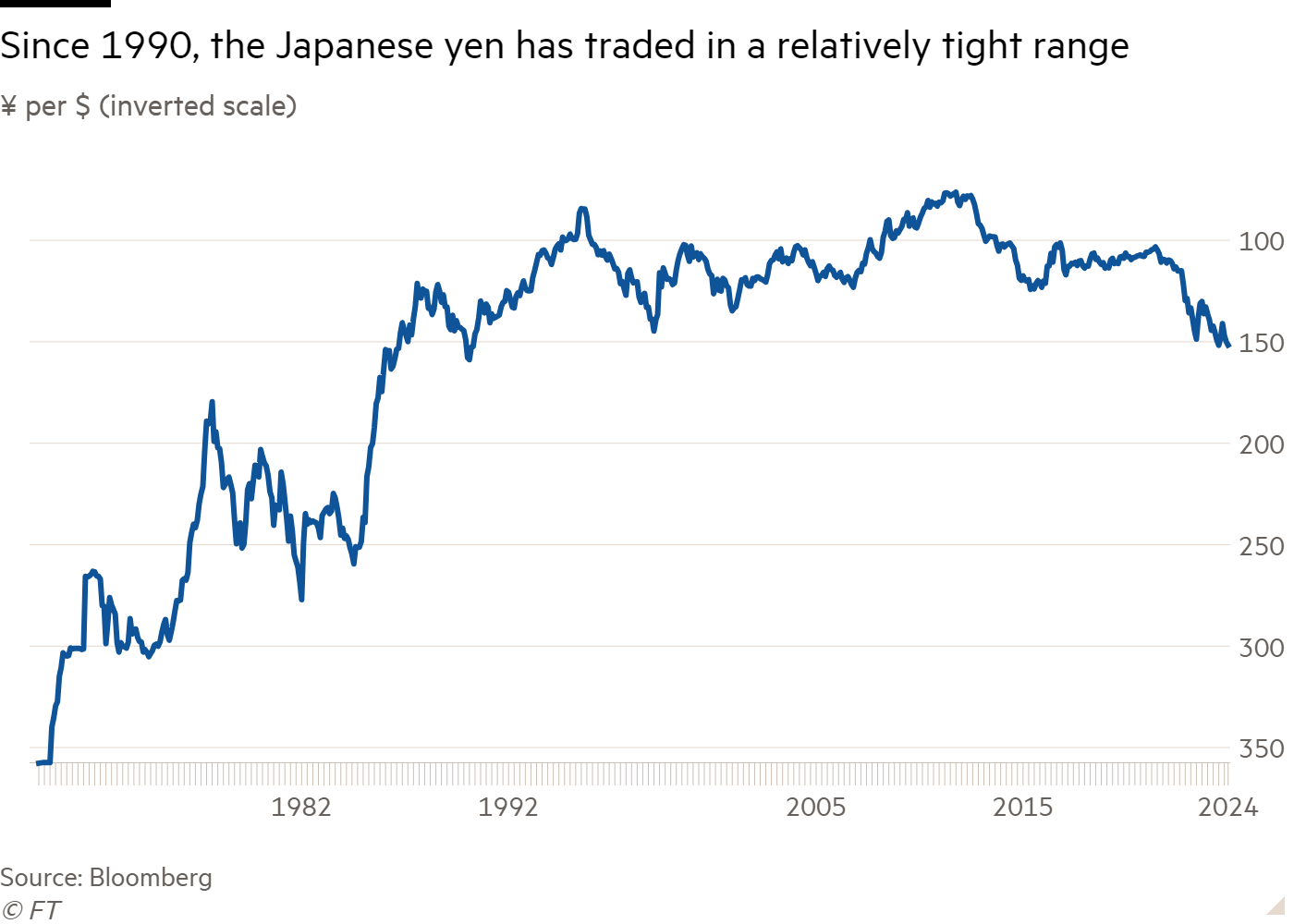Unlock the Editor’s Digest for free
Roula Khalaf, Editor of the FT, selects her favourite stories in this weekly newsletter.
The end of negative interest rates in Japan threatens to bring a new era of volatility for the yen, denting some of its allure to international investors and foreign governments seeking a reliable vehicle for low-cost borrowing.
Bank of Japan governor Kazuo Ueda brought an end to a decade of ultra-loose monetary policy and eight years of sub-zero borrowing costs on Tuesday, guiding the overnight rate to a range of zero to 0.1 per cent.
But the first rise in Japanese borrowing costs in 17 years — coming at a time when other major central banks are contemplating rate cuts — has the potential to fundamentally change the yen’s role in financial markets, said investors and economists.
Japan’s currency has held a unique position in foreign exchange markets since the 1990s, as the Bank of Japan kept rates low or negative to spur economic growth and stave off deflation. This has helped keep the yen stable, trading within a relatively tight range for much of the past 35 years.
“This will be viewed as a historic turning point,” said Derek Halpenny, head of research at Mitsubishi UFJ Financial Group. “The BoJ will now be data dependent. In theory that should mean the yen becomes more volatile . . . Volatility and expectations of further rate hikes in the future [make] the yen less attractive.”
The yen’s stability has made it currency of choice for investors placing carry trades, whereby an investor borrows in a low-yielding currency in order to fund investments in higher-yielding currencies and assets. It has also served as a preferred funding route for governments and companies during times of crisis, with many issuing so-called “Samurai bonds” in yen on the Japanese market.
The currency also usually rallies during times of financial market stress, as investors ditch their riskier trades and repay the Japanese currency they borrowed to fund them.
Analysts said that dynamic could change as the yen starts to behave more like other major currencies, responding to economic data and its implication for interest rates. In the long run, many believe that these changes will allow the yen to appreciate, in line with other economic changes in Japan.
“What is different after this meeting is the yen now has upside potential,” said Mark Farrington, global macro adviser at Farrington Consulting.
The change is also likely to affect investors, companies and governments, as they may no longer rely on the yen’s stability for carry trades, nor turn to it during economic turmoil.
“It is not a phenomenon that will happen overnight but the prevalence of the yen for investors and borrowers will decrease,” said Jane Foley, head of FX strategy at Rabobank.
The BoJ’s ultra-loose monetary policy is designed to stimulate economic activity and tackle deflation. But that has driven the yen to 35-year lows against the dollar in recent months, as the Federal Reserve raised rates to combat surging inflation. The yen dropped in the days after the BoJ’s announcement and on Thursday hit ¥151.55 to the dollar — its weakest rate since November.
Even so, analysts said the large gap in the two countries’ interest rates still left the yen as an attractive option for investors, particularly given the BoJ has signalled it will not raise rates again in the near future.

That makes the shorter-term direction of the yen against the dollar more dependent on the Federal Reserve’s policy and not the BoJ. The US central bank suggested on Wednesday it would cut rates down to between 3 and 3.25 per cent by the end of 2026.
“The big picture here is that the BoJ’s decision is less impactful in a world where the Fed has hiked over five percentage points. It will be hard for the yen to have a sustained rally without Fed action,” said Jonathan Peterson, senior market economist at Capital Economics.
Shusuke Yamada, head of Japan FX strategy at Bank of America, argued that companies and investors would still take advantage of the yen carry trade for the present.
Japanese companies using cheap yen funding to expand overseas will probably continue, and Japanese investors will probably proceed to sell yen to buy US equities in a version of the carry trade, said Yamada.
But if Japanese government debt becomes more attractive, then “the appetite for offshore carry could diminish for domestic Japanese institutions like life insurers and banks”, Yamada added.
The greatest impact of the BoJ’s historic decision may be felt by governments that have issued yen-denominated bonds.
Since 2022, a wave of heavily-indebted African countries including Kenya and Egypt have issued samurai bonds, as high interest rates and rising debt burdens have essentially locked them out of other capital markets for the past two years.

“A lot of the borrowing has been at a fixed rate, so [the BoJ’s decision] is unlikely to affect most current borrowers,” said Elvira Mami, senior economic analyst at think-tank ODI.
“But if the BoJ’s decision were to cause the yen to appreciate, it will be more costly for some [developing] countries to pay back their debt.”
Read More: World News | Entertainment News | Celeb News
FT









